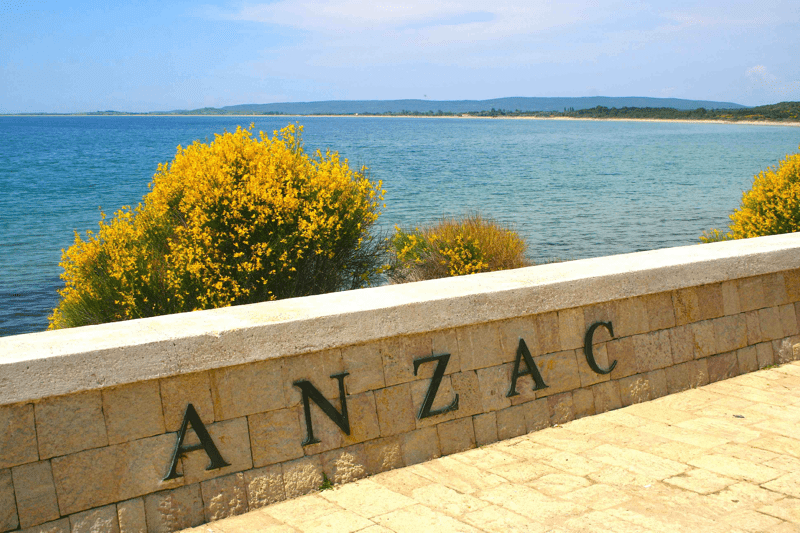
Boats carrying Australian, British, and New Zealand soldiers, advancing towards the shore, were all nervous about what awaited them, gripping their rifles. Captain Richard Willis, commander of C Company said, “It might have been a deserted land we were nearing in our little boats, then crack.”1 There was a door at the front of the boat that opened, and the machine gun fire was insane. Soldiers jumped off the boat fearing for their lives, equipped with their rifles and their 70-pounds worth of equipment. Some of them died instantly, but some made it to shore, only to be cut down by the barbwire that covered the shoreline, Captain Richard Willis described.2

It was war, the Great War, and the British and French troops needed to defeat the Ottoman Empire in order to get access to the Dardanelles straits. Their effort became known as the Gallipoli Campaign. Originally it was only a naval battle. With a fleet of eighteen warships, both British and French navies made an attempt to force their way through the Dardanelles. However, the Ottomans were too strong for them, and the attempt was a failure.3 The reason the Dardanelles were appealing at first was that they believed that it would not require many troops for this operation. How wrong they were. The Gallipoli campaign was conducted by General Sir Ian Hamilton with the plan on the 25th of April, 1915, to land at strategic points across the Gallipoli peninsula, with the ultimate goal of disarming the Ottoman forts at Kilitbahir, enabling the British navy to pass through the Dardanelles.4 The Anzacs were planning to land on Z beach as they were all code worded to S, V, W, X, and Z, all located at different points on the Peninsula. Z beach, located north Kabatepe, was planned to capture Hill 971 and another hill called Maltepe, and then move towards the Dardanelles and reinforce the British troops.5
April 25, 1915, the landing around Ari Burnu on the western side of the Gallipoli Peninsular was a complete mess, with the loss of 5,000 soldiers on the peninsula alone.6 Due to the horrific casualty number, it is now known as the ANZAC cove, in honor of these men. Gallipoli has become a defining moment in history for both Australian and New Zealand soldiers by defining both soldiers’ characteristics: endurance, determination, initiative, and brotherhood. For the Ottomans soldiers, it was the beginning of the decline in their domination of the war.7

The number of deaths in the trenches were diabolical. Over the whole eight months of the Gallipoli campaign, from April 25 to January 9, the allies lost 250,000 people, and the Ottomans lost around the same number. However, the initial landing at Gallipoli tallied up 60,000 people across all beach landings.8 Gallipoli was deemed a total failure overall. With so many casualties and not being able to achieve the objective of getting the naval ships through the Dardanelles, it has gone down in history as a failure of World War I. However, in Australian and New Zealand eyes, they are deemed heroes, going against all odds, fighting out numbered, and given the impossible you could say, for example the Battle of Lone Pine. But they were still able to carry out their duty and have gone down in history as imperishable.9
- Joshua Hammer, “A New View of the Battle of Gallipoli, One of the Bloodiest Conflicts of World War I,” Smithsonian.com, Febuary 01,2015. ↵
- Joshua Hammer, “A New View of the Battle of Gallipoli, One of the Bloodiest Conflicts of World War I,” Smithsonian.com. Febuary 01, 2015. ↵
- “The Anzac Portal,” Why Did Anzacs Land at Gallipoli? | The Anzac Portal ↵
- “Gallipoli: The First Day Centenary Edition,” Gallipoli Campaign, abc.net.au. ↵
- “Gallipoli: The First Day Centenary Edition,” Gallipoli Campaign, abc.net.au. ↵
- Nigal Steel, “What You Need To Know About The Gallipoli Campaign,” Imperial War Museums, June 26, 2018. ↵
- Nigal Steel, “What You Need To Know About The Gallipoli Campaign,” Imperial War Museums, June 26, 2018. ↵
- David Saul, “Time to Put the Record Straight on Gallipoli,” The Telegraph, April 25, 2015. ↵
- David Saul, “Time to Put the Record Straight on Gallipoli,” The Telegraph, April 25, 2015. ↵



36 comments
Faten Al Shaibi
It is good to know a little about what happened in World War I, the article learned us about the Gallipoli campaign, which there could be many of people didn’t know the details, I admitted that the Ottoman Empire was a powerful state, but sadly, lost many of the soldiers’ lives in this way. It is wonderful to honor them and reminded generations about their heroism.
Martina Rodriguez
I liked the use of a quote from Captain Willis in the beginning of the article. Not only the quote, but I loved that the first part of the article was actually his account of the experience. This really helped make the article interesting. The author does a good job of explaining the battle and all that it entailed. I really loved the ending few sentences, they really pulled the whole article together.
Harashang Gajjar
It was partly the attitudes of the British towards the ANZAC troops that led to the formation of antipodean identities separate from our British origins. We began to realise that the Brits saw us as distasteful “colonials” rather than as British. This trend has only continued. Now we are foreigners and the British government is actively hostile to us.Britain has no honor. And today is the day we recall that.The Turkish people quickly realised this and have been extraordinarily kind and generous to Antipodeans ever since. They have warmly welcomed ANZAC troops and their descendents returning to Gallipoli. They are demonstratively moved by the story. Whereas Brits tend not to even know the story and to sneer at us
Eric Ortega Rodriguez
I have never heard of the Gallipoli Campaign before this article, I find it extremely sad that many soldiers would lose their life immediately after reaching land. However, this demonstrates their courage and love for their country, since they were willing to risk it all. When it comes to war, everyone loses in the end. Overall, this was a very informative article with a good topic selection since the Gallipoli Campaign is something not many people know about. Good job.
Indhira Mata
This article brought the sorrow back from such a painful battle. The amount of fallen soldiers there was is unbelievable. I can not believe that never before this article I would have known about this. I agree with the homes of these soldiers. They are heroes. This is because they did not back down when they arrived they just kept fighting which is just amazing. Many would just return to their ships, but they didn’t.
Christopher Hohman
Nice article. The Gallopili campaign was such a disaster for the allied powers. The Ottamans were seen as weak, and the allies thought that they could easily crush them, but they were so wrong. The Ottamans were ready for them, and it must have been a terrible shock to the allied forces who attempted to land. The Australians and New Zealand forces were indeed heroes of this operation they gave their lives for the allied cause, and it is cool that we remember them especially for their sacrifice